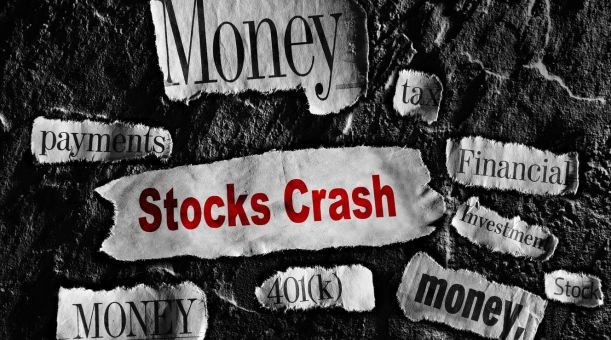Protecting Your Finances in a Stock Market Crash: Expert Tips and Advice
The S&P 500 has made a strong recovery in the first quarter of 2023, rising by approximately 7%, after experiencing a significant decline of 19.4% in 2022. Global stock markets were severely affected in the previous year due to concerns about high inflation, rising interest rates, and the possibility of an economic recession.
In particular, US technology shares suffered a major setback, with the Nasdaq Composite Index declining by over 30% throughout the year. Although the UK stock market remained more resilient, reaching a record high of 8,000 in February, it also experienced a decline of almost 10% over the following month. Given the ongoing uncertainty, investors may be seeking ways to safeguard their investments in the event of a future stock market crash.
What is a Stock Market Crash?

A stock market crash is a sudden and significant decline in the value of a stock market, often resulting in a loss of investor confidence and a widespread panic selling of stocks. A stock market crash can be triggered by a variety of factors, such as economic events, political instability, natural disasters, or unexpected events like pandemics. The severity and duration of a stock market crash can vary widely, and it may take years for the market to fully recover.
Signs of a Stock Market Crash:
- Rapid or sustained declines in major stock market indices
- Increased volatility and daily fluctuations in stock prices
- A sharp increase in the number of stocks trading at their 52-week lows
- A decline in trading volume as investors become hesitant to buy and sell
- A decrease in the number of IPOs and new listings on major stock exchanges
- A rise in the price of gold and other safe-haven assets
- A decline in consumer and investor confidence, often reflected in survey data or consumer spending patterns
- Economic indicators like rising inflation, high unemployment, or slowing GDP growth
- Geopolitical tensions or unexpected events that could disrupt markets (e.g. natural disasters, political upheaval, or major data breaches)
What to Do During a Stock Market Crash?
| Strategy | Description |
| Review your portfolio | Take a look at your current investments and make sure they align with your financial goals and risk tolerance. Consider rebalancing your portfolio if necessary to diversify your holdings and reduce risk. |
| Build an emergency fund | It’s always a good idea to have a cash reserve that can cover your living expenses for 3-6 months in case of unexpected job loss or other financial emergencies. |
| Consider adding defensive assets | Defensive assets like bonds, real estate, or gold can help cushion the blow during a stock market downturn. Consider adding these assets to your portfolio to reduce volatility and provide a source of stability. |
| Focus on quality companies | Look for companies with strong balance sheets, consistent earnings growth, and a history of weathering economic downturns. These companies are more likely to perform well during a market crash. |
| Stay informed and be prepared to act | Keep an eye on market trends and economic indicators, and have a plan in place for how you will react in case of a market downturn. Consider setting up automatic stop-loss orders or other protective measures to limit your losses. |
| Consult a financial advisor | A financial advisor can help you assess your risk tolerance, build a diversified portfolio, and develop a plan for weathering a market downturn. They can also provide valuable guidance and support during times of market volatility. |
What Causes a Stock Market Crash?

There is no single cause of a stock market crash, as it can be triggered by a variety of factors. Some of the common causes of stock market crashes include:
- Economic downturns
- Speculative bubbles
- Political instability
- Black swan events
- Central bank policies
How do you Protect your Money if the Stock Market Crashes?
Protecting your money during a stock market crash can be challenging, but there are several strategies that can help you minimize your losses and even capitalize on the downturn. Here is a complete strategy for protecting your money during a stock market crash:
Diversify your portfolio
One of the most effective ways to protect your money during a stock market crash is to diversify your portfolio. This means investing in a mix of stocks, bonds, cash, and other asset classes to spread out your risk. Diversification can help mitigate losses in one area of your portfolio, as gains in other areas can offset them.
Invest in recession-resistant industries
During a stock market crash, certain industries may be more resilient than others. For example, industries such as healthcare, utilities, and consumer staples are typically less affected by economic downturns. Consider investing in these industries to help protect your portfolio.
Use stop-loss orders
A stop-loss order is a tool that allows you to automatically sell a stock if it drops to a certain price. By setting a stop-loss order, you can limit your losses and protect your money in the event of a market downturn.
Keep cash on hand
It is important to have cash on hand during a stock market crash to take advantage of buying opportunities. By keeping cash on hand, you can buy quality stocks at discounted prices when others are panicking and selling.
Avoid panic selling
One of the biggest mistakes investors make during a stock market crash is selling their stocks in a panic. This often results in locking in losses and missing out on potential gains when the market rebounds. Instead of panicking, stay calm and stick to your long-term investment plan.
Seek professional advice
Working with a financial advisor can help you navigate a stock market crash and make informed decisions about your investments. A professional advisor can provide valuable insights, guidance, and support during times of market volatility.
Would the Stock Market Recover in 2023?
Although the stock market has experienced a modest rally in the first two and a half months of 2023, it still has a long way to go to recover from the significant losses it incurred in 2022. Specifically, the S&P 500 index fell by almost 19% during that time, which has left many investors wondering when a true recovery might take place. While there are indications that a recovery is on the horizon, the exact timing of such a rebound remains uncertain.
What is the Stock Market Predicted for 2024?
As of the first quarter of 2024, analysts are forecasting an 8% increase in the S&P 500 index, with a projected rise from 3,970.99 to 4,289. This forecast follows a year of optimism in 2022, during which every quarterly survey predicted that the market would experience growth in the following year.
Which Stock Grow in 2023?
- Reliance Industries
- Tata Consultancy Services
- HDFC Bank
- Infosys
Protecting Your Finances in a Stock Market Crash Protecting Your Finances in a Stock Market Crash Protecting Your Finances in a Stock Market Crash Protecting Your Finances in a Stock Market Crash Protecting Your Finances in a Stock Market Crash Protecting Your Finances in a Stock Market Crash Protecting Your Finances in a Stock Market Crash Protecting Your Finances in a Stock Market Crash Protecting Your Finances in a Stock Market Crash Protecting Your Finances in a Stock Market Crash Protecting Your Finances in a Stock Market Crash Protecting Your Finances in a Stock Market Crash Protecting Your Finances in a Stock Market Crash

